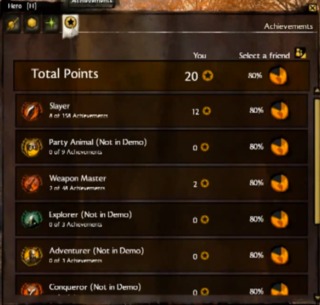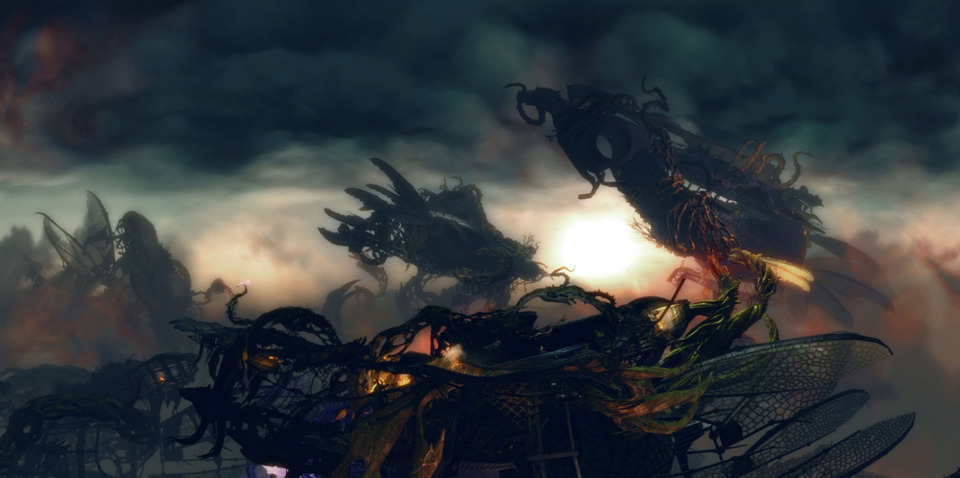Where does Guild Wars 2 go from here?
By feignamnesia 21 Comments
Did you know that the Heart of Thorns expansion came out a month ago? It does seem that if you weren't in the Guild Wars ecosystem already, you probably at best had a passing knowledge of the expansion, probably about as much as you did the game itself. Even the community — in the months before the expansion, bleeding away from the game every week — had very limited knowledge of its contents, of its release date. Under a solid nine months of silence after its prior content delivery stream — the living world — concluded its second season, it seemed a little too sudden, in the later half of June and early July, that we were being propositioned for money to preorder the game without really any idea of what was in it, what it concerned, or when it was coming out; and yet, the preorder prompt highlighted the most expensive, luxurious package for the player by default.
The proposition was this: given your experience with Guild Wars 2 so far, and without knowing what it is we're planning other than the generic trappings associated with the term "expansion pack", can we count on you to give us $99 for: in-game microtransaction currency valuing $40; exclusive skins and a minipet; a pre-order bonus title; and the game itself? Or hey, alternatively, how about just $50 for the game itself?
It's important I outline this perspective in the wake of the expansion's release because it is integral to picturing the sombre result of the leap of faith asked of the player population. Given the price point, equal to the cost of the base game — it having twenty-six maps, nine dungeons, six cities, and several different modes to play — and this lengthened communication blackout, wouldn't it be reasonable to expect a similar ambitious undertaking to fill that precedented value?
What Heart of Thorns included was this:
- A truncated conclusion to season 2 of the living story, at about half the length.
- Four open-world maps with three different vertical biomes.
- Gliders (but only in the expansion's maps).
- The Mastery system, which replaces the endgame experience bar for optional or required "masteries", which themselves get unlocked to be trained toward a total "mastery rank". This replaces your level.
- Guild halls for your guild.
- A new crafting profession, "scribe".
- A new profession, the revenant.
- Etc, etc. etc.
Mere quantity will not describe enough here — these are wonderful additions, certainly worthy of a $30 add-on, not necessarily a new game in their own right, but that is not even the concern. Guild Wars 2 took five years to develop on a modified codebase at least ten years old by present day; in nine months, that they've sped up development to this degree is cause for celebration, since it must have taken a considerable amount of time to add anything to the game before now.
My concern is the nature of the additions, their structure; and what this means for the further foundation of the game from here forward.
From the game's design manifesto:
Our games aren’t about preparing to have fun, or about grinding for a future fun reward. Our games are designed to be fun from moment to moment.
Mike O'Brien, April 27 2010

Guild Wars 2 was specifically built on a kind of fluidity and personal ambition unparalleled in the games before it; and like the quirks of its predecessor, led to its categorical subordination by fans of the genre, and likewise adoption by a like-minded niche audience. While the MMORPG upheld and codified the archetype and personal development into distinct, tangible roles and progression that were intended to fulfill through declaration, Guild Wars 2 wanted it to be in your hands what your characters would be. While other games in the genre had you on an individual quest, competing with your friends for rewards and kills, Guild Wars 2 wanted you to always be encouraged to work together and be universally rewarded. The personal story was diversified based on race, upbringing, personality (until a later patch half-removed it, leaving the options dangling, nerves intact), anything to make your understanding of the canon personalised and then leaving you to define what made you want to play, because the game is fun in itself. Development happens in real time in the social connections and roles you make yourself.
The additions implemented in Heart of Thorns are meant to be a threshold undertaking, a large push toward streamlining future advancement; it is intended to lay the foundation for the future:
...it's touching every major system and major component of the game, taking all the lessons we have learned so far, and saying: 'Hey, how do we make this better? How do we push the game even further?' To be in a good place moving forward for where GW2 is going to go."
Matt Wuerffel, March 26 2015
The pushes include contextual development, easy developmental iteration; and the immediate impression is that this is not an expansion pack for the players so much as the developers, redirecting their talents toward streamlining everything, and offloading the cost of that necessary task to the players in the hopes of greater, bigger stories in the future. Placing new masteries to earn in new areas, in a supposedly indefinite mastery rank that, again, replaces the level. Allowing a framework for future expansion in a controlled, unchaotic way, so that content delivery is efficient and consistently profitable.

The issue is that these additions are also all about grinding for reward. Beyond the story — itself quite slim — you are left for goals that are made to cost as much as possible to keep you playing the maps which themselves are so long, so consistently action-packed, that it triggers prior anti-grind game measures playing them normally, as the diminishing returns system decreases your loot and experience points the longer you play on the same map.
Top-tier armor that increasingly pushes the boundary between recommended and required is significantly more expensive and significantly harder to get as a random drop. You won't get this stuff just by playing — now you either go grind the gold out to craft it yourself or, maybe, just maybe, buy the gold with real world money. The pressure is on: the armor is more necessary, more scarce, and more expensive simultaneously if you intend to play the game seriously at all.
The guild hall system pressures players to join larger guilds that in turn pressure consistent playtime and increased commitment. The hall itself requires at least a dozen people — at the top of their game, if so — to capture, meaning temporary alliances are a must or larger guilds are then the only ones who can get this selling point of the expansion. The new crafting profession is coincidentally by far the most expensive in the game, which keeps their numbers scarce while still providing an equal achievement for mastering it; the question becomes, who is the one person in the guild who gets the profession, and what happens if they stop playing?
While I could mention the new legendary system, legendaries were originally meant to be scarce, and so their four-tier, hundreds-of-achievements progression system is justifiable. It takes significant investment.
This just leads to base gameplay. The structure of these new additions universally requires a significant amount of grinding and commitment — and this wouldn't be an issue if, as O'Brien states, the game is fun "from moment to moment".
Of course, fun is subjective — but the game definitely prioritises different kinds of fun. The later-game segments of the base game, in Orr, are all about constant engagement. They have several meta-events that allow limited-time vendors and the gradual takeover of the map in exchange for the entire map shard (your persistent instance shared with people from your world) participating in full force. You are consistently attacked, only able to explore in the few moments between nameless mob encounters. In Heart of Thorns, all of the zones are endgame zones, and the meta-events require more and longer participation. You are not permitted to idly explore, and to pick and choose what interests you; in the expansion, you will be required to participate in these events to get anywhere at all — and you will have to find your way into a fuller shard if you want to progress. More players in fewer shards for longer periods of time is the implicit pressure, and this makes for far less casual and far less individualised play.
You are alert and at arms, slowly gaining the experience for your mastery of choice; obtaining box after box of random loot for the odd chance at something valuable; and over time, gaining less and less of both by the game's own grind prevention measures. Players invariably then head to the greatest farm train and park themselves behind a commander's tag instead.
There is a principle in game design that states that the player will always opt for the best solution for a given problem. It doesn't matter if you want them to take out a specific gun to take out a foe — if their gun of choice does the job better anyway then that specific gun will never find use. It needs to demonstrate its own use.
In Guild Wars 2, farming gold — this is also known as grinding, if you're keeping track — becomes the most efficient solution over naturally heading out to do whatever it is the player finds fun. Ergo, if the player is not having fun moment to moment, why are they playing the game? To work toward something in the future that is fun, instead. The journey is subordinate to the end reward. This is also what every other game in the genre does.
In making its future iterations more efficient, the game has deprioritised its prior principles in favour of promoting fuller, fewer maps, that require to be manually moved to different shards in order to progress; longer player investment per session, which in turn gets punished by prior game mechanics, because end-game 'optional' rewards are becoming less optional, and more the de facto endgame. If you are making your own goals, it will almost invariably be one of these streams, that all coincidentally require you to begin a grind.
But are you having fun?
I hesitate to criticise this series because I love it — I love the universe and its progressive take on recovering from disaster (and not reliving the glory days of the past). I loved the first Guild Wars enough to play it for seven years as my game of choice, simply getting lost in the world, crafting my characters' stories. And the developers are so friendly, so available that it feels like striking down my friends — they comment on forums everywhere, their personal twitter accounts far from hidden, and all in love with their work. It's this sincerity that made the chaos of the base game so appealing: they so focused on different areas, so continually experimented, and so rewarded you for experimenting with them that the formalisation of this experimentation also brings with it a bittersweet ending, because it so seemingly requires adopting the antithesis of its manifesto to operate.
This is the future of Guild Wars 2. I hope we're ready for what comes next, and I hope we have fun.
